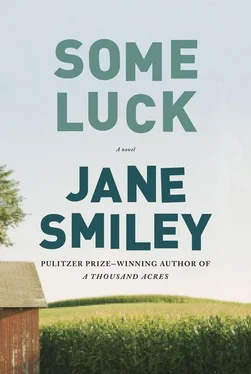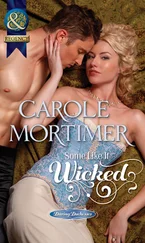“Try the pork on him,” said Granny. “I cooked it all day. He might like it.”
Mama used the thing that was not her spoon or her fork, the thing he could never have, and pressed her plate over and over with it. Then she brought it to him on her spoon. It smelled so good that he opened his mouth, and in it went. “Down the hatch,” said Papa, and Frank opened his mouth for more.
“What’s in that?” said Papa.
“Just the usual. Some onions and a little fennel seed. Not much of that. Cooked forever.”
Mama said, “He likes most things, I have to say. He took a bit of liver the other day. Made a face, but swallowed it.”
“Never had a picky eater in our family,” said Granny. “You yourself ate asparagus when you were eight months old. Never saw a child just take a stalk of asparagus and gobble it down like that. Slaw. Boiled cabbage. Everything.”
“It’s the German in ’em,” said a deep voice. “ Ja , it is. I myself liked sauerkraut better than anything when I was a boy. The others were bellying up to the apple pie, and I would ask my mama for another spoonful of sauerkraut.”
“Ah, well,” said Granny, “what else was there to eat in those days? Got old pretty quick, you ask me.”
All this time, Mama was giving him bits of things on the tip of her spoon, many different things, and he was a good boy. He recognized the applesauce and the sweet potato and the crust of bread. He took more of the pork and another green bean. The air was full of conversation, and many words he was already familiar with, though he had no idea what they meant — oats, corn, hogs, steers, barley, harvest, sale barn, threshing, crib, snow, freeze — as well as words that he did understand — sleet, cold, sunshine, spoon, aunt, uncle, no, good, bad, Frank, more, eat, thank you. His eyes roamed from face to face, and then Granny said a word, “Cake,” and it went around the room—“Look at that cake!” “Lovely cake, Mary!” “My favorite cake.”
All the dishes were cleared from the table, and Papa set him right in the middle, but holding him all the time, and the faces made a noise together — not a bad noise, “Happy Birthday to You!”—and then Mama took him back on her lap, and handed him something soft, and he tasted it, and then he ate it, but only because he was a good eater, and a good boy, and ready for anything. Then Mama took him away into a dark room, and nursed him, and, for goodness’ sake, they both fell asleep on the bed, her arm over him and his mouth around her nipple, because, although he wasn’t really hungry, his chances to partake of this pleasure had gotten fewer and fewer.

FIRST, Rosanna had arranged it so that her sister, Eloise, would live with them, and it was all going to work out for the best, since they had a better school for her nearby. When she wasn’t in school, she could help with Frank, who was getting around the house at about a mile a minute. Then she made a plan with Mrs. Frederick down the road to hatch some chickens in the old henhouse — she cleaned it out before telling Walter a thing about it — thirty to start. Rosanna had grown up raising chickens, and she missed them, and Eloise was used to chickens, and she and Walter both knew without saying a word that if all he did was break even for the year, then there had to be egg money. Walter, she knew, wasn’t fond of chickens — their mess got everywhere if you weren’t careful, and they could be underfoot — nor did he especially care for eggs, since he had eaten fried eggs every morning for his whole life because that’s what his father liked and his mother made. Well, chickens. Then there could be ducks and turkeys. And Eloise would sleep in with Frank, since Ragnar had the third bedroom. But Eloise was happy to come — one baby to take care of was preferable to three brothers. And none of them talkers — Eloise said days could go by without Gus, Kurt, or John saying a word. This was not true of Eloise, as Rosanna reflected when Eloise asked again — was it for the twentieth time? — “So little Frankie didn’t get baptized?”
Rosanna was ironing and Eloise was folding. Frankie was down for his afternoon nap. Rosanna said, “Did you go to a baptism, Eloise? No, you didn’t. If we had had a baptism, then you would have gone, and there would have been a breakfast after, and there wasn’t. Why do you keep asking me?”
“I don’t know.”
Rosanna took the shirt she was ironing off the ironing board, turned it over, and pressed the tip of the iron along the seam of the collar. It was not quite hot enough, so she took it over to the stove, set it down, and picked up the other one. Eloise said, “Do you think we’ll ever get electricity?”
Rosanna didn’t say anything. She wasn’t particularly in favor of electricity, those wires running who knew where. She said, “Is Mama sending you little notes telling you to keep asking me about that baptism?”
Eloise stared at her, then said, “No.”
Then she said, “Not really.”
Then she said, “But I know she’s worried. Cousin Josie’s boy got up one morning and was dead of cholera by the time he went to bed that night.”
“No, he—”
“And that boy who was in our school, he was just in first grade, the horses spooked and the wagon wheel went right over him.”
“And Walter’s brother died when he was two and Walter never got over it, even though he wasn’t born yet.” She handed the shirt to Eloise, who began doing up the buttons, and took another one out of the ironing basket. Rosanna liked ironing shirts — it was soothing — but she also didn’t mind pants and overalls and sheets and pillowcases. If doing laundry was a chore, ironing was its reward.
“I don’t think you should laugh about it.”
Rosanna spread a sleeve across the ironing board. “Well, I’m not, but they talk more about Lester than they do about Howard, who died in the influenza.”
“He was a baby.”
“He was older than Frankie.”
“So there,” said Eloise.
Rosanna bit her lip, and didn’t say any more. Either she had talked herself into a corner, or Eloise had won the argument, she couldn’t quite tell which, but that was the way it was with Eloise. Even the teacher at school had said to Rosanna, “I had to tell her that she could only raise twenty objections in the morning and twenty in the afternoon. They tend to bring a halt to the educational process.”
Rosanna began ironing the back of the shirt, and Eloise went into the kitchen to check on the bread. Of course that was why Rosanna was so careful with Frankie — more careful than Walter liked, and in some sense more careful than Walter knew. If you were a Catholic and you were baptized and you were a child who hadn’t had First Communion, then you were not damned to Hell if you died, you went to Limbo, and then, as far as Rosanna was concerned, because she couldn’t imagine any truly bad thing happening to one of God’s children, you moved on to Heaven and you were fine forever after. Methodists also believed in original sin and infant baptism, but there was a catch, and Rosanna had memorized it — there could be a parent or godparent, but it could not be her unbaptized self, and she could not therefore bring herself to allow the baptism. And so, without even discussing the matter, she and Walter were at an impasse with regard to Frankie.
Why had this not come up at the wedding (a Methodist wedding)? Well, the answer was that Rosanna was headstrong, and had never cared much for religion, and had wanted to marry Walter and get out of the crowd that was her own family. She had assumed nothing else was important. It was only after marriage that you began to think about sin, and if one side of the family (all around, and full of opinions) believed one thing, and the other side (also in and out of the house) believed another, you had to pretend that all beliefs were equally silly and then live with the consequences.
Читать дальше













